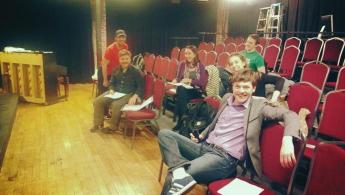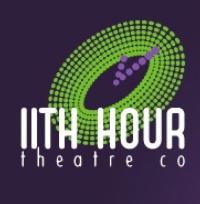Related Topics
Theatre in Philadelphia
Theater has declined, everywhere in the western world. But in Philadelphia, even today if you attended every new play you would keep pretty busy.
Food and Drink in Philadelphia
A flowing abundance of food sources made Philadelphia the capital of food and drink, right from earliest times.
Cultural
Culture and Traditions (2)
Right Angle Club: 2013
Reflections about the 91st year of the Club's existence. Delivered for the annual President's dinner at The Philadelphia Club, January 17, 2014.
George Ross Fisher, scribe.
Musical Theatre at the 11th Hour

|
| Michael O'Brien |
Philadelphia is having a theatrical revival, very likely leading the cities of America in that regard. One of the central movers and shakers of that movement visited the Right Angle Club recently. Touting his own company, without a doubt, but nevertheless illuminating a movement which seems pretty central to Philadelphia's future. Michael O'Brien is the Producer and Artistic Director of the 11th Hour Theatre Company, which had its origin eight years ago in the Studio of the Walnut Street Theatre, and has since spread out to many venues within Philadelphia. Since Mike O'Brien got his start in theater at the Walnut, it is only fair to say the Walnut Street Theatre was a parent of the 11th Hour. The 11th Hour is a 501(c) (3) nonprofit corporation, so it sort of sounds as though the William Penn Foundation was somewhere in the background, at least at one time.
The 11th Hour Theatre Company is one of 1200 theater companies now active in Philadelphia but is the only company dedicated exclusively to musicals. More finely tuned than that, it specializes in small productions with five or six members of the orchestra, and about the same number of actor/singers on stage. It happens there aren't very many such productions to chose among, so someone must stimulate more composers to pay attention, or the 11th Hour could run out of musicals to produce. Some of this is economic. The kind of big-time musical comedy which makes a gazillion dollars with a huge cast, huge orchestra, huge scenery is very expensive to produce, and probably soon runs out of audience members who are willing to pay huge ticket prices for anything except a huge production success, produced at huge financial risk. For the most part, the national market will only profitably support one or two of those a year, with the consequence that lots of people lose a lot of money on the ones which fail, and most of the successes are rescued by movie and television revenue, which involve further financial risk-taking. Apparently, the successful composers either try to claw their way to the big brass ring or else look for other lines of work. Someone may eventually figure out a way to start with a small musical and then scale it up to the big-time, but what has happened seems to be that actors and musicians who shrug off the big time, cluster together and try to produce a career which prefers a normal sort of home life, to the neurotic struggling which seems inherent in those who consider themselves big-time theatrical material. Somehow, the dictionary definition of the 11th Hour -- the time when most creativity appears -- has instant appeal to the sort of person who prefers to live a normal life within a close circle of like-minded friends and finds that to be a possibility in Philadelphia. We'd like to remind him you can't fill the seats of a theater without an enthusiastic audience, but it's nice to hear our town is a congenial place to live and be an actor.

|
| 11th Hour Theater |
Michael O'Brien regards the theatrical revival of Philadelphia to be part of the restaurant revival of the 1980s. Just as the nightlife of Philadelphia was once centered around coming to town to go to the movies, Mr. O'Brien regards the theater as the centerpiece of an evening in town for a couple who want to come for exotic food, plus some entertainment. We have night clubs and celebrity concerts for the dating set, but a quiet dinner followed by the theater appeals to a different, somewhat older set. Once this movement gets started, performers arrive from out of town and discover they like the sort of life entertainers enjoy here, so they stay. And many graduates of local colleges and universities grow up close enough to the scene that they decide they never want to leave. Naturally, a producer and artistic director has the perspective of the performing community and tends to emphasize the attractiveness of Philadelphia to performers. In addition to that, of course, enough dumb old plain citizens have to be attracted to the theatrical product, in order to provide audiences for 1200 theatrical companies; and novelty alone is not enough to sustain that. Some such mutual need was once provided by the sudden Elizabethan flowering of the theater of London, and five hundred years later no one has completely explained it. But for comparison, in Shakspere's day, there were fifty-nine London theaters at the height of the Elizabethan boom, but only two in Paris.
Originally published: Friday, February 01, 2013; most-recently modified: Friday, May 24, 2019